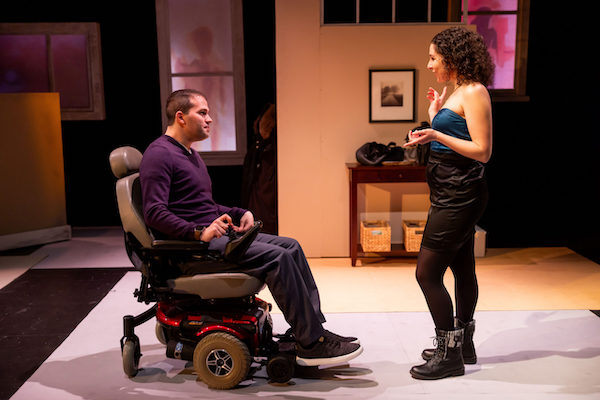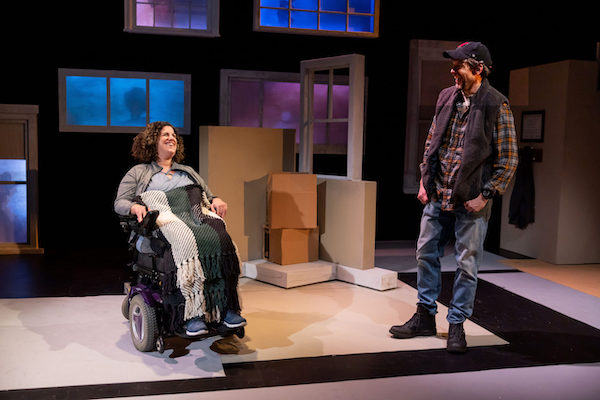Theater Review: “Cost of Living” — A Powerful Drama About Our Longing to Connect
By Martin Copenhaver
Critical to the success of Cost of Living is playwright Martyna Majok’s refusal to resort to tropes about people with disabilities and those who care for them.
Cost of Living by Martyna Majok. Directed by Alex Lonati. Staged by SpeakEasy Stage Company at the Roberts Studio Theatre, Boston Center for the Arts, 527 Tremont Street, Boston, through March 30.

Sean Leviashvili (left) and Gina Fonseca in the SpeakEasy Stage production of Cost of Living. Photo: Nile Scott Studios
Through much of Cost of Living two separate dramas unfold, each consisting of two characters — a person with disabilities and a caregiver.
In one, John, a PhD candidate at Princeton with cerebral palsy, is cared for by Jess, who attended Princeton herself. It does not take long for us to know that John is wealthy. He presents his haughtiness as if it were a calling card. When Jess asks during her interview how she should refer to him, John replies, “Are you planning on talking about me?” When Jess replies, “No,” John counters, “Why not? I’m very interesting.” He goes on to question her motivations, her physical strength, her willingness to do anything required of the job. It is clear that he wants the interview to be as tough as the job will be. At first, Jess gives the kind of pat answers she thinks John is looking for. As the interview proceeds, however, her responses turn feisty and sometimes wary. She admits that she is interested in the job simply because she needs the money.
In the other storyline, Eddie, an unemployed truck driver, shows up at the apartment of his estranged wife, Ani, who suffered a quadriplegic injury in an auto accident and is now confined to a wheelchair. He says he is there to pick up some of the things he left behind, but his forced cheeriness reveals that he is there for other reasons, as well. He offers to take care of Ani and, when she resists, he implores her to try out the arrangement on a temporary basis. Ani, having been hurt by Eddie’s infidelity and abandonment, balks at the prospect of taking him back in any capacity, keeping him at bay with mordant wisecracks. She questions his motives. Is he there because he is broke? Out of guilt? Because he has nowhere else to go? Besides, she is worried that she might be burned by Eddie’s sunniness, warning him, “I’m gonna be sad, pissed ‘n’ sad, fer however long I’m pissed ‘n’ sad, ‘n’ that’s fine. I feel like feelin whatever I feel right now [sic.].”
Critical to the success of Cost of Living is playwright Martyna Majok’s refusal to resort to tropes about people with disabilities and those who care for them. It is not surprising to learn that Majok once served as a personal care aide for two disabled men. Undoubtedly, her experiences lend her narrative some of its depth and nuance. It may also explain why Majok insists that the characters of John and Ani be played by actors with disabilities, which is the case here. Both Stephanie Gould (Ani) and Sean Leviashvili (John) have cerebral palsy.
Majok understands the pace of caregiving. In one scene, Jess helps John into a shower. It is a slow and arduous process, with many steps, few words, and no shortcuts. In another play, or in less capable hands, a scene this slow would beg to be cut or shortened. But not here. It seems entirely right and telling. After all, disability slows people down and calls upon others to slow down in response. Caregiving takes as long as it takes.
The play also poignantly captures the intimacy of caregiving. Nothing, save caring for an infant or being in a sexual relationship, can match the physical closeness of this kind of caregiving. In the case of Eddie and Ani, this intimacy includes echoes of the sexual relationship they once shared. That dynamic is not part of the relationship between John and Jess. Over time, however, it is evident that, for Jess, caregiving has been transformed into caring and in ways that are ultimately heartbreaking.

Stephanie Gould (left) and Lewis D. Wheeler in the SpeakEasy Stage production of Cost of Living. Photo: Nile Scott Studios
There is nothing sentimental about Majok’s depiction of the four characters. Their stories are not intended to inspire. Their illnesses do not edify or fortify. There are no heroes here. It turns out that people with disabilities, and their caregivers are a lot like… well, people.
Ultimately, however, Cost of Living is not a play about living with disabilities or caring for those with disabilities. It is more about the inability of people to connect, in spite of their longing for connection. In the long monologue that begins the play, Eddie talks to an unseen stranger in a bar about his life as a trucker: “That life is good. The road. Sky. The scenery. Except the loneliness. Except in the case of all the, y’know, loneliness.” Eddie continues to talk in an animated way until the stranger simply walks away. Even before the play begins we are eyeball-to-eyeball with the overarching theme of the play, which is, y’know, loneliness.
The monologue is a gutsy way to begin because it presumes that the audience can be interested in a character’s melancholic ramblings before we have come to know anything else about them. It is the sort of monologue that, if you were forced to listen to it while sitting on a barstool in an actual bar, you might very well walk away yourself. As played by Lewis Wheeler, however, Eddie’s monologue is captivating. He is spinning tales, largely for his own benefit, and we are more than content to go along for the ride.
In the concluding scene of the play, which Majok calls an “Epilogue,” the two storylines are brought together. Jess and Eddie, no longer in their caretaking roles, meet by chance. It is another opportunity to find connection, but once again that opportunity is missed. Or is it?
Having Jess and Eddie interact at the end of the play could be dismissed as contrived, but to me it felt more like a musical resolution at the conclusion of a piece of music. The final chord can land in a way that releases the tension of what has gone before and that feels fitting and true.
Wheeler is a stand-out in an ensemble that is consistently excellent. Stephanie Gould, portrays Ani as someone who guards her physical and emotional fragility with a kind of disarming gallows humor. Sean Leviashvili captures the character of the upper crust John in the way he speaks — in a halting voice because he must and with a quiet voice because he can — confidently assured that others will pay attention. Gina Fonseca brings passionate energy to the role of Jess. Her character displays the widest range of emotions and is the one who changes the most during the course of the play. Fonesca is well up to the challenge.
The set, designed by Janie Howland, features windows of various sizes and different angles in which we can barely discern shadowy figures. It brings to mind the scriptural observation that in this life we “see through a glass darkly.” It is a visual reminder that we may know others and ourselves, but only dimly.
The most enthusiastic kudos, however, are due the playwright. Cost of Living, which in 2018 was awarded the Pulitzer Prize for Drama, is a powerful and affecting work. It deserves an excellent staging and, gratefully, in this production it gets just that.
Martin B. Copenhaver, the author of nine books, lives in Cambridge and Woodstock, Vermont.
Tagged: Alex Lonati, Cost of Living, Gina Fonseca, Lewis D. Wheeler, Martyna Majok, Sean Leviashvili, SpeakEasy Stage Company

Went to see it on Friday and thought it was funny,sad. Ani was so great! Enjoyed all the characters! Very entertaining!
A+